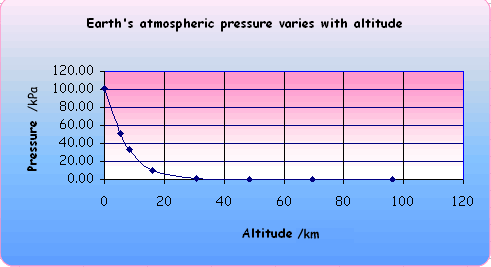Atmospheric Pressure
At sea level the Earth's atmosphere is pushing on you from all sides with a pressure of 101,000 N/m2 (101 kPa). As you climb higher - away from sea level - that pressure decreases. This is because there is less air above you, weighing you down. We are not aware of the air pressure - we are designed to live with it. If we go to high altitudes we have difficulty breathing. This is because our lungs are used to taking in enough air to obtain the amount of oxygen we need. When we are at a high altitude a lung full of air contains less oxygen than it would on the ground because the density of the air is lower.We therefore breathe more rapidly at high altitudes until our bodies accustom themselves to the lower oxygen concentration.
Weather and air pressure Atmospheric presure varies widely over the Earth's surface. It varies according to the amount of water vapour in the atmosphere in a locality and the temperature of the air molecules. This variation iscaused by uneven heating of the atmosphere by the Sun's rays. The pressure differences cause the winds to blow. Air moves from high pressure areas to low pressure areas. It does this most efficiently in a circular manner (like emptying a filled milk bottle is fastest if you swirl the fluid!). The weather stations map out the pressure and lines of equal pressure (isobars) on weather charts. They then use these to forcast the weather.
High pressure systems (anticyclones) are associated with settled, clear, cool, fresh weather. Around high-pressure systems, winds flow clockwise in the northern hemisphere, counterclockwise in the southern hemisphere.High pressure usually means good weather. Low pressure sytems (a depression) are generally unsettled and stormy due to the fact the warm air rises making the system it is on having low pressure. Which is generally the reason for storms and tropical cyclones.Tornadoes invariantly have very strong local low-pressure systems at their centres. Winds circulate around low pressure in an anti clockwise direction in the Northern |
Follow me...
|








